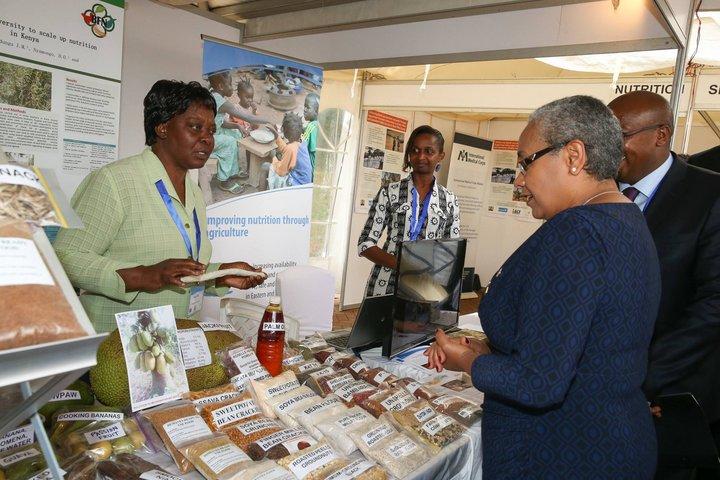The SUN shines brightly on Kenya's efforts to link nutrition and agriculture

Kenya’s First Lady, Ms. Margaret Kenyatta, welcomes efforts under the Scaling Up Nutrition (SUN) umbrella to bring together government ministries, donors, UN agencies, civil society and business organizations to better link nutrition to agriculture.
Nairobi 18-19 February 2015
Biodiversity and locally available foods provide cheap and ready access to key micronutrients to help boost mother and child nutrition, particularly children from 6 to 24 months of age when breast milk alone is insufficient and mothers switch from exclusive breastfeeding to feeding infants with family foods. This was the message the Biodiversity for Food and Nutrition Initiative (BFN)* through its partner, the Kenya Agricultural and Livestock Organization (KALRO), brought to the National Nutrition Symposium where the new EU-funded Maternal and Child Malnutrition Program, worth US$ 23 million jointly launched by the Government of Kenya, the European Union and UNICEF in Nairobi, was unveiled.
It is now widely recognized that 51 nutrients are required in steady and adequate amounts to support healthy development in children and maintain physical and mental functions in adults. Speaking at the event, the First Lady of the Republic of Kenya, Ms. Margaret Kenyatta, recognized that child physical and mental impairment is directly linked to the lack of access to nutritious foods: “Vitamins and minerals are important and we can obtain them from fruits and vegetables but unfortunately women and children are not consuming them as regularly as expected and this leads to vitamin and mineral deficiencies”.
According to the Global Nutrition Report, efforts to reduce undernutrition in Kenya have been regrettably slow, with no significant change in the nutritional status of children below five years of age since 1998. The First Lady also highlighted that one child out of three, under the age of five, still suffers from stunting, which means they are below adequate height for their age. Changing the quality and quantity of food available to children and their mothers can go a long way in reducing the prevalence of this condition which weighs heavily on the development of Kenya as a nation.
The First Lady welcomed efforts under the Scaling Up Nutrition (SUN) umbrella to bring together stakeholders from the government ministries, donors, UN agencies, civil society and business organizations and particularly efforts to link nutrition to agriculture through the Nutrition Interagency Coordinating Committee (NICC). Dr Victor Wasike, National Project Coordinator for the BFN Initiative in Kenya and who also represents BFN on the NICC, was instrumental in advocating the use of biodiversity in food-based interventions to tackle malnutrition. According to Dr Wasike, participating in committees such as the NICC provides an excellent opportunity to showcase the work that the BFN initiative is undertaking at the county and grassroots level in Busia to promote nutrient-rich biodiversity. It can also help significantly in efforts to mainstream biodiversity into national plans and action and the scaling up of local activities. Perhaps most importantly Ms. Kenyatta called for “both national and county governments to allocate enough resources to support the implementation of a national nutrition action plan” and offered support for counties to develop their own nutrition plans under Kenya’s new devolved system.
Good news is that the BFN Initiative in Kenya is already working closely with policy stakeholders from Busia County to develop a Biodiversity Conservation Policy that takes into account the importance of conserving nutrient-rich traditional foods such as cowpea, amaranth, arrow root and sorghum to increase diet quality and access to key micronutrients, particularly for mothers and children. Working with a multi-disciplinary team of experts from the county Ministries of Agriculture, Health, Education, Environment, Public Health and Forestry, KALRO and members of the local community-based organization SINGI, the BFN Initiative is promoting best practices linked to the establishment of home gardens, health and sanitation, nutrition, meal planning and preparation as well as value addition. In 2015, seven extension groups, 10 primary schools, 7 secondary schools and 7 community health units will pilot test these practices to be scaled up if successful.
As Danny Hunter, BFN Global Project Coordinator, explains: “One of the unique aspects of the BFN initiative has been to put in place in each country innovative multi-sectoral policy platforms which for the first time bring together the environment, agriculture and health sectors. These BFN platforms are important in terms of leveraging biodiversity to enhance dietary diversity and nutrition and to take advantage of the current interest around improving nutrition and agriculture linkages. Linking these BFN platforms to already existing national mechanisms targeting nutrition such as the Nutrition Interagency Coordinating Committee can really pay dividends when it comes to highlighting the important role of local nutritious biodiversity and making sure that it is considered as one of a number of options when addressing malnutrition.”
Watch a video of the First Lady speaking at the event here
*The GEF 'Mainstreaming biodiversity for nutrition and health' initiative is led by Brazil, Kenya, Sri Lanka and Turkey and coordinated by Bioversity International, with implementation support from the United Nations Environment Programme (UNEP) and the Food and Agriculture Organization of the United Nations (FAO) and additional support from the CGIAR Research Program on Agriculture for Nutrition and Health.
For more information, contact Teresa Borelli, [email protected]
Photo: From the Facebook page of the Office of the First Lady Kenya - First Lady Margaret Kenyatta with Rhoda Nungo and Angela Kimani when she toured the 'KALRO - Utilizing biodiversity to scale up nutrition in Kenya' exhibition stand ahead of the official opening of the National Nutrition Symposium and Launch of the GOK-EU-UNICEF Maternal and Child Nutrition Program at Kenya School of Government, Lower Kabete.
